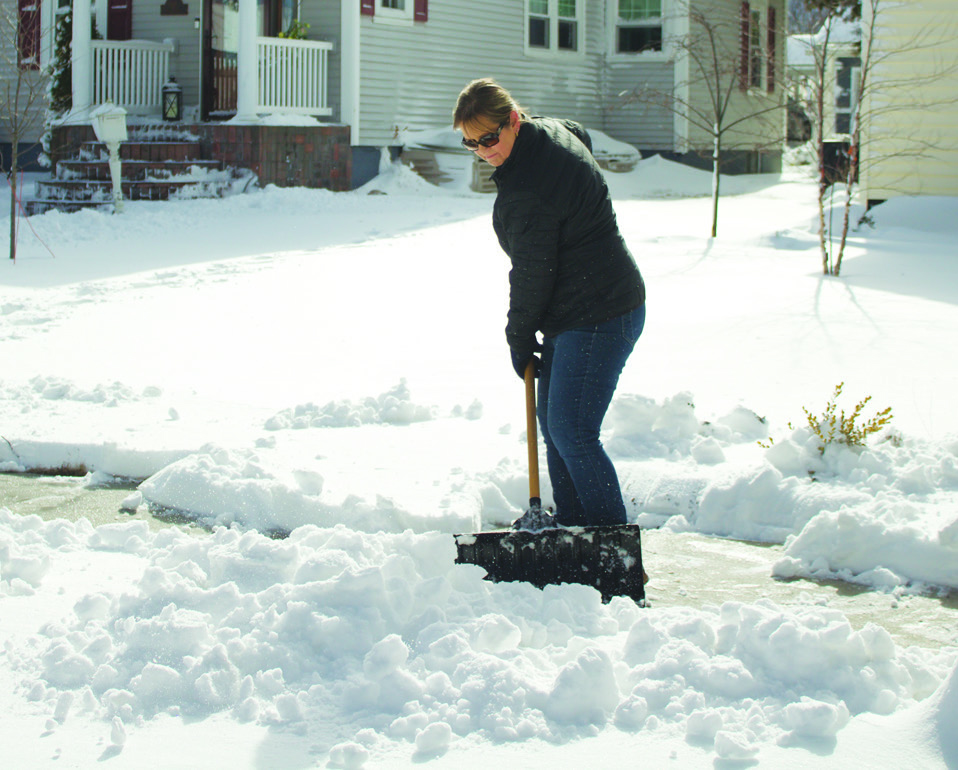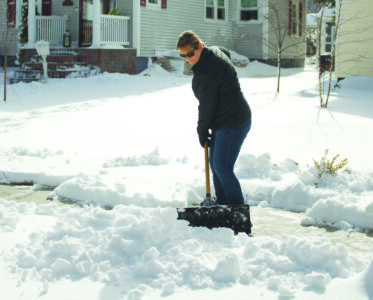New rules proposed for snow, weeds

Daily Press file photo A resident on the southside of Escanaba shovels her sidewalk earlier this year after a late-March snowstorm dropped roughly 10 inches of snow on the city the night before.
ESCANABA — The Escanaba City Council this week held the first reading of ordinances that would change the city’s rules about snow removal on sidewalks and weeds on private property.
Proposed Ordinance No. 1313 more than doubles the length of the existing section of the city code regarding sidewalk maintenance and codifies the amount of time that snow and ice can be left on sidewalks in both commercial and residential areas. In the business district — currently defined in the proposed ordinance as the “eastern boundary of Ludington Street starting at 3rd street to the west boundary ending at N. 30th St and Willow Creek Road and Lincoln Road extending from 18th Avenue South north to College Avenue” — property owners must remove snow within 24 hours after it has fallen or accumulated on the sidewalk. Outside of the business district, property owners have 48 hours to remove the snow.
In both cases, if the snow is not removed by the set deadline, the city manager may order the city to remove the snow and ice with the expense of the removal — plus a 10% fee — charged to the property owner.
“When it came to snow removal, there was no defined time period when you had to have your snow removed (and) your sidewalks cleared. So, basically, this just clears that up,” Public Safety Director John Gudwer told the council.
While residents may have believed in the past that they were required to remove snow in a set period following a storm, the existing code dictating sidewalk maintenance doesn’t discuss snow removal. Property owners are simply required “to keep the public sidewalks immediately abutting their property in good order and repair.” That language is maintained in the proposed ordinance amending the sidewalk rules.
Two aspects of the proposed ordinance are expected to change by the second reading and possible adoption of the document at the Aug. 7 council meeting. The first is the business district, which the council and City Manager Jim McNeil proposed extending to eastward on Ludington Street by one block. The change would add the House of Ludington and Delta Abstract & Title to the district, making those businesses subject to the same 24-hour rules as the rest of the city’s downtown area.
The second change will be related to language in the proposed ordinance that would allow property owners in the business district to push snow and ice into “a compacted pile along the curb to facilitate removal by the city.” Council members expressed concerns that the language was too vague, deviated significantly from past practice, and that business owners would not leave the piles compact enough to avoid becoming a hazard or too cumbersome for city workers to remove.
It is unclear based on Thursday’s discussion of the language whether the city council will opt to strike the idea of pushing snow into the street entirely or if the language will be modified to make the idea more feasible for the city and business district property owners.
Also Thursday, the council held the first reading of a separate ordinance that would bring the city’s property maintenance rules in line with the 2024 International Property Maintenance Code, a system of rules produced by the non-profit International Code Council, which is also responsible for construction building codes across the United States. For decades, the city has used a property maintenance code based on the ICC’s predecessor, the Building Officials Code Administrators International (BOCA), which merged with two other code standardizing organizations in 1994.
The two codes are similar, but changes in building materials and construction practices mean the older code is out of date. The ordinance proposed Thursday will refer the the ICC’s code, allowing changes in the International Property Maintenance Code to be adopted by the city as they are made by the ICC.
While noted as a change from past practice in the proposed ordinance, the property maintenance code used by the city already required that “all sidewalks, walkways, stairs, driveways, parking spaces and similar areas shall be kept in proper state of repair, and maintained free from hazardous conditions to include snow and ice.” Neither the 2024 code nor the code already adopted by the city include timelines for maintenance related to snow and ice.
However, the new rules do make a change in how tall weeds can be before a property owner is out of compliance with the code. Currently, only weeds 10 inches or taller are considered violations. If adopted, the new ICC rules would drop that to 8 inches.
Other changes in the code would change the period during which insect screens must be installed in every door and window from June 1 to Nov. 1 to April 1 to Oct. 31 and make adjustments to time frames where rental housing and workspaces are required to be heated. It would also make minor changes to section references.


